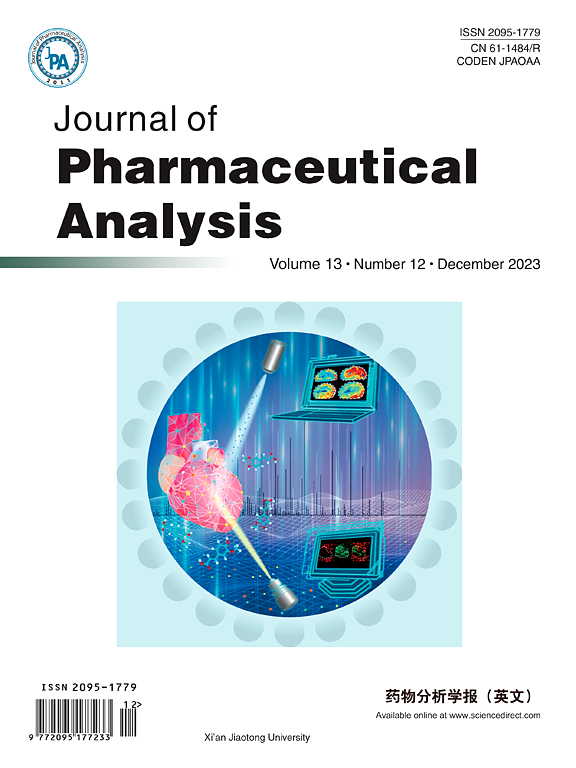通过共价标记和质谱法绘制双特异性抗原结合生物治疗剂的构象变化图
IF 8.9
1区 医学
Q1 PHARMACOLOGY & PHARMACY
引用次数: 0
摘要
生物治疗药物的高阶结构(HOS)是决定其功能特性和构象相关性的关键因素。在这里,我们评估了两种共价标记方法:二乙基吡咯碳酸酯(DEPC)标记法和蛋白质快速光氧化法(FPOP),并结合质谱法(MS)来研究被称为双特异性抗原结合生物疗法(BABB)的新型免疫肿瘤疗法的结构修饰。所评估的技术揭示了在原生和热应力条件下抗原结合结构域内氨基酸残基水平发生的微妙结构变化,而这些变化是传统生物物理技术(如近紫外光圆二色仪(NUV-CD))无法检测到的。在原生和应力条件下标记吸收的确定变化得到了结合试验的证实,揭示了结合效应,并突出了共价标记方法有效监测构象变化的潜力,而构象变化最终会影响产品质量。我们的研究为利用所开发的技术阐明新型疗法的固有结构特征及其构象稳定性奠定了基础。本文章由计算机程序翻译,如有差异,请以英文原文为准。
Mapping conformational changes on bispecific antigen-binding biotherapeutic by covalent labeling and mass spectrometry
Biotherapeutic’s higher order structure (HOS) is a critical determinant of its functional properties and conformational relevance. Here, we evaluated two covalent labeling methods: diethylpyrocarbonate (DEPC)-labeling and fast photooxidation of proteins (FPOP), in conjunction with mass spectrometry (MS), to investigate structural modifications for the new class of immuno-oncological therapy known as bispecific antigen-binding biotherapeutics (BABB). The evaluated techniques unveiled subtle structural changes occurring at the amino acid residue level within the antigen-binding domain under both native and thermal stress conditions, which cannot be detected by conventional biophysical techniques, e.g., near-ultraviolet circular dichroism (NUV-CD). The determined variations in labeling uptake under native and stress conditions, corroborated by binding assays, shed light on the binding effect, and highlighted the potential of covalent-labeling methods to effectively monitor conformational changes that ultimately influence the product quality. Our study provides a foundation for implementing the developed techniques in elucidating the inherent structural characteristics of novel therapeutics and their conformational stability.
求助全文
通过发布文献求助,成功后即可免费获取论文全文。
去求助
来源期刊

Journal of Pharmaceutical Analysis
Chemistry-Electrochemistry
CiteScore
16.20
自引率
2.30%
发文量
674
审稿时长
22 weeks
期刊介绍:
The Journal of Pharmaceutical Analysis (JPA), established in 2011, serves as the official publication of Xi'an Jiaotong University.
JPA is a monthly, peer-reviewed, open-access journal dedicated to disseminating noteworthy original research articles, review papers, short communications, news, research highlights, and editorials in the realm of Pharmacy Analysis. Encompassing a wide spectrum of topics, including Pharmaceutical Analysis, Analytical Techniques and Methods, Pharmacology, Metabolism, Drug Delivery, Cellular Imaging & Analysis, Natural Products, and Biosensing, JPA provides a comprehensive platform for scholarly discourse and innovation in the field.
 求助内容:
求助内容: 应助结果提醒方式:
应助结果提醒方式:


